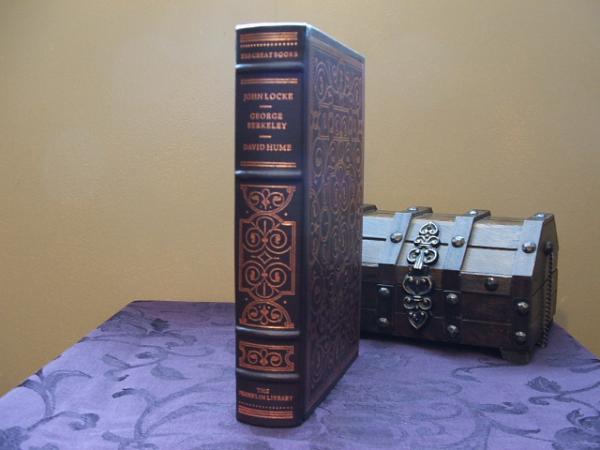Easton Press John Locke books
Two Treatises of Government - 1991Works of John Locke - Harvard Classics - 1993
Franklin Library John Locke books
Works of George Berkeley, John Locke and David Hume - Great Books of the Western World - 1984
Franklin Library John Locke books
Works of George Berkeley, John Locke and David Hume - Great Books of the Western World - 1984John Locke biography
John Locke, a towering figure of the Enlightenment era, was born on August 29, 1632, in Wrington, Somerset, England. He is celebrated as one of the most influential philosophers in history, renowned for his profound contributions to political theory, epistemology, and the concept of individual liberty. Locke's early life was marked by intellectual curiosity and academic rigor. He received his education at Westminster School and later at Christ Church, Oxford, where he immersed himself in the study of philosophy, medicine, and natural sciences. It was during his time at Oxford that Locke encountered the works of prominent thinkers such as Descartes, Bacon, and Hobbes, whose ideas would profoundly shape his own philosophical outlook.In 1671, Locke embarked on a transformative journey as he entered into the service of the Earl of Shaftesbury, a prominent statesman and political figure. This association provided Locke with firsthand exposure to the political upheavals and ideological debates of his time, laying the groundwork for his seminal works on governance and civil society. Locke's magnum opus, Two Treatises of Government, published in 1689, stands as a cornerstone of modern political philosophy. In this work, Locke articulated his theory of natural rights, positing that all individuals are endowed with inherent rights to life, liberty, and property. He argued that legitimate governments derive their authority from the consent of the governed and have a duty to protect the rights and freedoms of their citizens. Locke's ideas laid the groundwork for the principles of liberal democracy and constitutional governance, profoundly influencing the development of modern political thought.
In addition to his contributions to political philosophy, Locke made significant strides in the field of epistemology with his landmark work, An Essay Concerning Human Understanding, published in 1690. In this treatise, Locke expounded his theory of empiricism, contending that human knowledge is derived from sensory experience and perception. He famously likened the human mind to a blank slate, or "tabula rasa," upon which knowledge is acquired through observation and reflection. Locke's empiricist philosophy revolutionized the way scholars approached the study of knowledge and laid the groundwork for the scientific method.
Throughout his life, Locke remained deeply committed to the pursuit of truth, reason, and tolerance. His writings on religious toleration, embodied in works such as A Letter Concerning Toleration, advocated for the separation of church and state and the protection of individual conscience. Locke's advocacy for religious freedom and tolerance continues to resonate in modern debates surrounding liberty and pluralism. John Locke's legacy endures as a beacon of enlightenment and rational inquiry. His profound insights into the nature of government, knowledge, and human rights have shaped the course of Western civilization and continue to inspire generations of thinkers, activists, and statesmen. Locke's enduring influence serves as a testament to the enduring power of ideas and the transformative potential of philosophical inquiry.

No comments:
Post a Comment
Share your best book review and recommendation